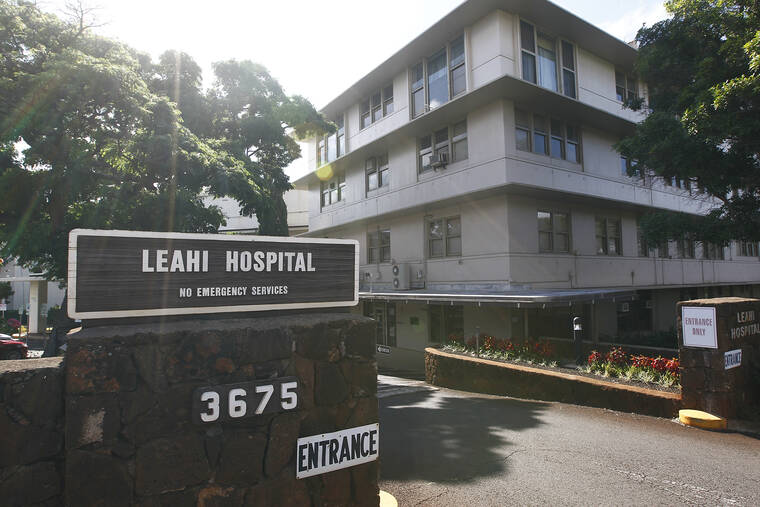An effort to transfer two Oahu hospitals to the state Department of Health to help fill the island’s desperate need for treatment options for residents suffering from mental health and substance abuse problems is on the brink of failing, with DOH officials now saying it would be cumbersome and cost too much.
The Legislature passed a bill in 2021 requiring that Leahi Hospital and Maluhia nursing home be transferred from the Hawaii Health Systems Corp. to DOH by the end of 2022, a deadline that was later extended due to the COVID-19 pandemic. The legislation was strongly backed by DOH and HHSC’s Oahu regional board and administrators who operate the facilities.
DOH, at the time, told lawmakers the transfer would help the state provide more behavioral health services and was a “rare opportunity to add significant value to our residents’ quality of life.” And HHSC’s chief administrative officer for Oahu said Leahi Hospital may be able to treat as many as 64 psychiatric patients, freeing up space at the Hawaii State Hospital, the state’s only psychiatric hospital, which is overcrowded with court-ordered patients. The added space could help DOH provide mental health care for patients not ordered to the hospital by the courts.
But after spending more than $452,000 studying the transfer, officials from both agencies told lawmakers during budget briefings before the House Finance Committee in recent days that they had concluded the transfer was a bad idea. It would cost an estimated $4.1 million to execute the transfer, with ongoing additional costs pegged at $3.7 million in fiscal year 2023 and rising to $6.6 million annually by 2026, according to a DOH report.
The report found the biggest cost would be paying new DOH staff to assist with operations.
DOH Deputy Director of Behavioral Health Marian Tsuji told the House Finance Committee on Wednesday that in addition to the costs, the move would require the transfer of contracts and grappling with regulatory requirements related to psychiatric care.
“I do know (that) to house psychiatric and mentally ill or substance abusing patients with skilled-nursing facility patients, there are some credentialing issues, so that you really need to have a good strong wall between the two,” she said. “So that was a big concern.”
The HHSC system includes about a dozen public hospitals, long-term care facilities and affiliated clinics on Oahu, Hawaii island and Kauai that provide heavily subsidized “safety net” services in many of the state’s more rural regions.
Tsuji told lawmakers that it was cheaper to contract services for the entire system. “HHSC currently gets economies of scale by running these contracts for the entire state,” she said.
While the transfer was supported initially by HHSC’s Oahu administration, CEO Linda Rosen told the Honolulu Star- Advertiser that she always felt the transfer was problematic.
“I happen to feel that it was fairly evident that HHSC provides all kinds of services,” she said, pointing to its IT, legal, fiscal and human resources support. “To just move almost 500 employees and all of these things over to DOH and not think there would be a cost … .”
Leahi Hospital, located in Kaimuki, first opened in 1901 to care for tuberculosis patients and currently provides nursing home and adult day health services. Maluhia, located in the Liliha-Kapalama area, operates a 158-bed skilled-nursing and intermediate care facility.
Leahi Hospital, in particular, has suffered from neglect and portions of the hospital’s buildings are undergoing repairs. Derek Akiyoshi, CEO of HHSC’s Oahu region, told the House Finance Committee that 75% to 80% of the two facilities’ usable space was being occupied.
DOH now plans to push for a bill this year repealing the requirement that it take over Leahi Hospital and Maluhia.
The department’s position has irked some lawmakers.
“It is disappointing to me,” said Sen. Joy San Buenaventura, chair of the Senate Health and Human Services Committee. “It seems to me that it signals their lack of commitment to increasing behavioral health treatment, which is sorely needed in the state.”
Buenaventura said she was skeptical of the cost argument.
“If we really want to be serious about cutting down the chronic homelessness, then we really need to address behavioral health,” she said. “That to me is why it is disappointing.”
Rep. Della Au Belatti, chair of the House Committee on Health and Homelessness, told DOH officials during Wednesday’s hearing that she understood that their working group had decided the state no longer needed the transfer, but that DOH and HHSC’s Oahu region needed the Legislature to approve that.
“What I am concerned about is that there is this great need,” she said in reference to behavioral health care.

